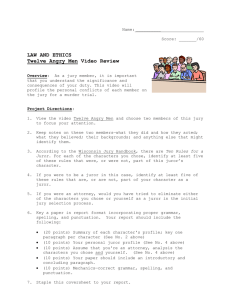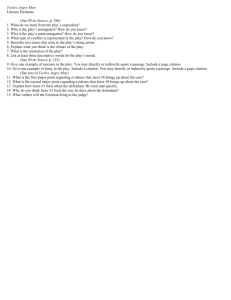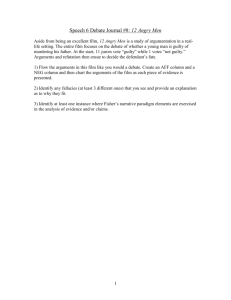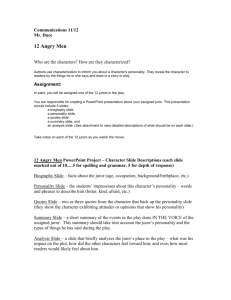C-model essay 12AM
advertisement
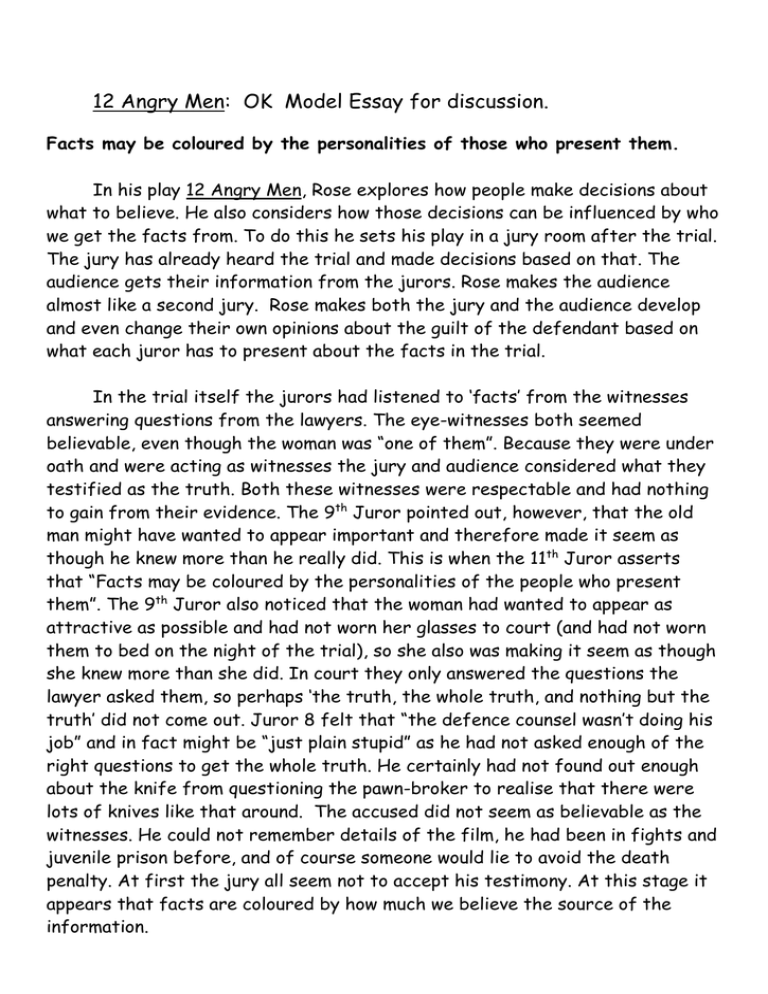
12 Angry Men: OK Model Essay for discussion. Facts may be coloured by the personalities of those who present them. In his play 12 Angry Men, Rose explores how people make decisions about what to believe. He also considers how those decisions can be influenced by who we get the facts from. To do this he sets his play in a jury room after the trial. The jury has already heard the trial and made decisions based on that. The audience gets their information from the jurors. Rose makes the audience almost like a second jury. Rose makes both the jury and the audience develop and even change their own opinions about the guilt of the defendant based on what each juror has to present about the facts in the trial. In the trial itself the jurors had listened to ‘facts’ from the witnesses answering questions from the lawyers. The eye-witnesses both seemed believable, even though the woman was “one of them”. Because they were under oath and were acting as witnesses the jury and audience considered what they testified as the truth. Both these witnesses were respectable and had nothing to gain from their evidence. The 9th Juror pointed out, however, that the old man might have wanted to appear important and therefore made it seem as though he knew more than he really did. This is when the 11th Juror asserts that “Facts may be coloured by the personalities of the people who present them”. The 9th Juror also noticed that the woman had wanted to appear as attractive as possible and had not worn her glasses to court (and had not worn them to bed on the night of the trial), so she also was making it seem as though she knew more than she did. In court they only answered the questions the lawyer asked them, so perhaps ‘the truth, the whole truth, and nothing but the truth’ did not come out. Juror 8 felt that “the defence counsel wasn’t doing his job” and in fact might be “just plain stupid” as he had not asked enough of the right questions to get the whole truth. He certainly had not found out enough about the knife from questioning the pawn-broker to realise that there were lots of knives like that around. The accused did not seem as believable as the witnesses. He could not remember details of the film, he had been in fights and juvenile prison before, and of course someone would lie to avoid the death penalty. At first the jury all seem not to accept his testimony. At this stage it appears that facts are coloured by how much we believe the source of the information. Some people have prejudices or information of their own, and the facts that they hear or ignore are coloured by these. Rose’s Juror 3 is a character who represents people who cannot separate their own emotions objectively from the situation they see before them. Juror 3 has a broken relationship with his own son and he sees this reflected in the crime. He wants to blame the defendant for killing his father in the same way that he wants to blame his own son for fighting and then abandoning him. The 10th Juror is dreadfully prejudiced against “them”. Rose uses this character to represent xenophobic or otherwise bigoted people. The 10th Juror’s wants to incriminate this young man as soon as possible, “like a self-appointed public avenger”, to protect society and to stop people like him from spreading their bad influence. At the time of the play this could be compared to McCarthy’s fear of communism taking over, or, in ours, to a fear of Islamic terrorism. It is not that these dangers don’t exist, it is that the fear can stop people from making a rational or objective decision about the facts and the type of people involved; and that is what Rose is trying to illustrate. In these instances, what facts people believe is not greatly coloured by the personality of those who present them, instead, these jurors would just listen to and believe anyone who shares the same opinion as themselves and ignore or be angry with anyone else. It is hard for people to listen objectively to facts from someone they dislike. Juror 3 is rude and unpleasant and has been what most of the jury and audience would consider a terrible father. It is hard to see that he was trying to do what he saw as the right thing and “make a man outa” his son. The 10th Juror is even worse because he swears, makes personal attacks on other jurors, and even threatens to kill Juror 8. Rose makes him as unsympathetic a character as possible and so both the rest of the jury and the audience are not receptive to his opinions about “these people”, even though statistically this might be true. In fact Juror 4 says “slums are breeding grounds for criminals”. Similarly, the audience does not like the 7th Juror who selfishly and irresponsibly just wants to make a decision as quickly as possible so he can get to the baseball. These characters are the strongest voters for ‘guilty’ and because the audience dislikes them Rose encourages the audience to side with the more sympathetic characters on the ‘not-guilty’ side. Juror 9 is a sweet old man, Juror 5 is someone from the slums who made good, and Juror 8 is the responsible voice of reason. All these characters represent the cross-section of the community that the audience is meant to like and want to be part of. The way an audience sees their facts is coloured in a positive way so they are more believable. There are some other factors than just personality that can colour a person’s perceptions of the facts. It is really hot and stifling in the juror’s room. Tiredness, weather, and boredom also affect the juror’s decision making powers. Juror 12 is maybe too easily influenced and keeps changing his mind. One fairly normal desire is to go along with the group. “It’s not easy to stand alone against the ridicule of others,” which is why Juror9 first alters his vote to support Juror 8. Juror 8 has very strong convictions about the responsible way to discuss the trial. In the end, it is the strength of his personality that makes the other jurors respect him enough to listen to him and ultimately respect his way of considering ‘the facts’ of the trial. Circumstances, personality, prejudice and even intelligence do make a difference when it is time to “separate the facts from the fancy”. It also is clear in 12 Angry Men that Rose does consider that the personality of the person presenting the facts has an important influence on decision making. He uses the courtroom as representative of the larger democratic process. He encourages his audience to look beyond the personality of say a Gillard or an Abbot when making important decisions, and to concentrate on the facts demonstrated by their actions.

